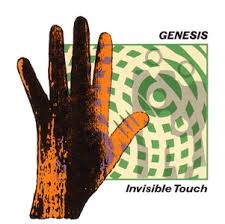- Invisible Touch (1986) – This album is the band’s most commercially successful, reaching No. 1 in the UK and No. 3 in the US. It produced five top-five singles in the US, including the chart-topping title track “Invisible Touch.”
- We Can’t Dance (1991) – The album was a huge hit, reaching No. 1 in the UK and No. 4 in the US. It produced several hit singles like “No Son of Mine,” “I Can’t Dance,” and “Jesus He Knows Me.”
- Duke (1980) – Duke was the band’s first album to reach No. 1 in the UK and did well in the US, peaking at No. 11. It included hits like “Turn It On Again” and “Misunderstanding.”
- Genesis (1983) – Often referred to as the “Mama” album, it reached No. 1 in the UK and No. 9 in the US. The singles “Mama,” “That’s All,” and “Home by the Sea” were major hits.
- Trick of the Tail (1976) – The first album with Phil Collins as the lead vocalist after Peter Gabriel’s departure, it was a commercial success, reaching No. 3 in the UK and No. 31 in the US.
1. Invisible Touch (1986)

Genesis’s 1986 album Invisible Touch is pivotal in the band’s career, blending pop and rock elements to achieve critical and commercial success. The album became the band’s best-selling release, marking their first and only No. 1 album in the UK and reaching No. 3 in the US. With its polished production and catchy melodies, Invisible Touch produced five top-five singles in the US, including the chart-topping title track “Invisible Touch,” making Genesis a household name in the mid-80s pop-rock scene.
The album showcased the band’s evolution from their progressive rock roots to a more accessible pop-rock sound, appealing to a broader audience without sacrificing their musicianship. Tracks like “Land of Confusion” and “Tonight, Tonight, Tonight” further solidified the album’s impact on the charts and in popular culture. Invisible Touch remains a defining moment in Genesis’s discography and a key example of 1980s rock music.
2. We Can’t Dance (1991)

We Can’t Dance represents a high point in the band’s career, blending their classic rock sound with contemporary 1990s influences. The album was a commercial success, reaching No. 1 in the UK and No. 4 in the US, and featured a series of hit singles that solidified Genesis’s status in the rock scene. With its mix of powerful ballads and energetic tracks, We Can’t Dance showcases the band’s ability to evolve while maintaining their signature sound.
The album includes standout tracks like “No Son of Mine” and “I Can’t Dance,” which became anthems of the early ’90s. We Can’t Dance is notable for its lyrical themes that address social issues and personal reflections, resonating with a wide audience. The production is polished, reflecting the era’s style, and the album remains a significant part of Genesis’s discography.
3. Duke (1980)

Duke marks a significant shift in the band’s sound, blending their progressive rock roots with a more accessible pop-rock approach. This album was a commercial triumph, reaching No. 1 in the UK and peaking at No. 11 on the US Billboard charts. Duke is known for its sophisticated production and the seamless integration of synthesizers, which were becoming increasingly popular in the late 70s and early 80s.
The album features a mix of introspective ballads and upbeat tracks, showcasing the band’s versatility. With hits like “Turn It On Again” and “Misunderstanding,” Duke solidified Genesis’s reputation as one of the leading bands of the era. The album’s success is also attributed to its strong songwriting and the band’s ability to adapt to changing musical trends while maintaining their unique identity. Duke remains a key entry in Genesis’s discography and a highlight of their transition into the 1980s.
4. Genesis (1983)

Genesis’s 1983 self-titled album, commonly known as Genesis, represents a high point in the band’s evolution towards mainstream success. The album achieved significant commercial success, reaching No. 1 in the UK and No. 9 in the US. This release referred to as the “Mama” album, features a polished pop-rock sound that captures the essence of early 1980s music trends.
Genesis includes the hit singles “Mama,” “That’s All,” and “Home by the Sea,” each showcasing the band’s ability to blend catchy melodies with thoughtful lyrics. The album’s production is marked by synthesizers and innovative sound techniques, reflecting the era’s musical landscape. Genesis is notable for its darker themes and sophisticated arrangements, demonstrating the band’s skill in adapting to the changing music scene while maintaining their distinct style. The album remains a defining moment in Genesis’s discography and its influence on 1980s rock music.
5. Trick of the Tail (1976)

A Trick of the Tail is a landmark release that marked the band’s transition following Peter Gabriel’s departure. With Phil Collins stepping up as the lead vocalist, this album showcases Genesis’s continued prowess in progressive rock while introducing a fresh sound. A Trick of the Tail was well-received, reaching No. 3 in the UK and No. 31 in the US, and is noted for its inventive use of keyboards and complex arrangements.
The album features epic tracks and more concise compositions, reflecting the band’s ability to evolve while retaining their core progressive rock elements. A Trick of the Tail is recognized for its strong storytelling and musical creativity, solidifying Genesis’s place in the rock genre during the 1970s. The success of this album demonstrated that Genesis could thrive with a new lineup and continue to innovate in the progressive rock landscape.

